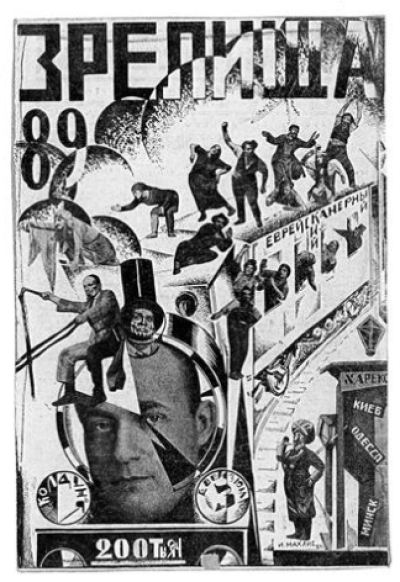Search results
1667 pages found for Yiddish club

Tsvishn Veltn (Between Worlds): A Night of Cabaret
by TOVA MESSER This year's Uriel Weinreich Summer Program in Yiddish Language, Literature and Culture was kicked off on Tuesday, June 18, 2013 by a retro-chic evening of drinks, refreshments and entertainment celebrating avant-garde Yiddish-Russian culture. A lively cocktail hour in the Great Hall was followed by performances by Artists in ResidenceShane ...

Speaking of kneydlekh...
Joseph Berger’s article in The New York Times, “Some Say Spelling of a Winning Word Wasn’t Kosher” (May 31, 2013), notes that YIVO is by recognized by many as the authority on Yiddish. The winning word in the Scripps National Spelling Bee was knaidel (matzoh ball), or, as the spelling rules ...

Knaidel/Kneydl
By JONATHAN BRENT
Executive Director, YIVO Institute for Jewish Research
Much ink has been spilled over the knaidel/kneydl quasi-controversy since it erupted in the wake of the Scripps National Spelling Bee on May 30, veering from the ponderous and scholarly to the frivolous and silly. While no YIVO scholar was consulted, expert opinion has been cited from the YIVO Institute, as has the hoary authority of Merriam-Webster. Culinary and orthographic precedents have been invoked from generations past. The history of Jewish nationalism in Eastern Europe on the one hand, and the kitsch of the Borscht Belt have chimed in. “My Little Matzoh Ball,” sung by Little Rita Carol Age 12, a popular song from the 1950s, has begun to circulate on the internet thanks to the sound archivists at the YIVO Institute. The Carnegie Deli has enjoyed the spotlight again for what many might consider a dubious, commercial product. Fox News, TIME, The New York Times, Urdu language blogs in Pakistan and India, The Jewishpress.com, and esoteric Yiddishist blogs around the world have all joined in this celebration of—what? A word? A mystery of spelling? Other such mysteries of spelling and transliteration abound: gray/grey; theater/theatre; travelling/traveling; Czar/Tsar; Tchekhov/Chekov/Chekhov. Chances are that if the final question posed to young Arvind Mahankali were “theater,” it would have been prefaced with the injunction to provide the American spelling; or if of the word “Czar,” to provide the primary American spelling. No such caution occurred with “knaidel.” Why?

Di gantse velt af a firmeblank: The World of Jewish Letterheads
Assemble the letterheads of Jewish organizations, institutions, and individuals in Europe, North and South America, and Palestine from the 1890s to the eve of World War II in 1939 and you have a portrait of the Jewish world: transnational; diverse in language, political, and religious orientation; and flourishing. Di gantse velt ...

Di gantse velt af a firmeblank: The World of Jewish Letterheads
Assemble the letterheads of Jewish organizations, institutions, and individuals in Europe, North and South America, and Palestine from the 1890s to the eve of World War II in 1939 and you have a portrait of the Jewish world: transnational; diverse in language, political, and religious orientation; and flourishing. Di gantse velt ...

More about Benjamin Harshav, z”l (1928-2015)
Two weeks ago, we reported on the death of Benjamin Harshav, translator, poet and eminent scholar of Hebrew and Yiddish literature. He died at age 86 in New Haven, Connecticut.
Since then, several full-length obituaries have appeared online, mourning his passing and celebrating his work and accomplishments. Forward notes that he was a mentor to “generations of students” and discusses his career in Israel as a poet and as a scholar at Tel Aviv University, where he founded the Department of Poetics and Comparative Literature.

Limited Run at Theater 80: Making Stalin Laugh
“In 1921 the GOSET troupe moved into a theater less than a mile from the Kremlin. For 28 years, through purge, terror, and paranoia, they presented world-class theater in Yiddish to audiences that only spoke Russian. And then they went too far.”
On May 17 and May 18, New Yiddish Rep will present a multi-lingual workshop production of David Schneider’s “Making Stalin Laugh" at Theater 80 in New York. The play features Israeli television star Gera Sandler and Yelena Shmulenson (“A Serious Man”) and is directed by Allen Lewis Rickman (“The Big Bupkis”; the Yiddish “Pirates of Penzance”).
Originally presented in London, New Yiddish Rep’s production will be the play’s American premiere. In this revised version of the play, which first appeared in English, the characters will sometimes speak Russian, sometimes Yiddish, sometimes English, sometimes German, etc., just like their real-life counterparts did — but all dialogue will be simultaneously translated via English supertitles projected directly over the actors’ heads.

YIVO Offers Courses for Scholars and Public School Teachers (1966)
In this episode, originally broadcast on February 13, 1966, Dr. Mordkhe Schaechter talks about a course in standardized Yiddish orthography recently offered by YIVO. Host Sheftl Zak talks about a class for public school teachers entitled “One Hundred Years of Yiddish Literature” that is about to begin and about the ...

Di gantse velt af a firmeblank: The World of Jewish Letterheads
Assemble the letterheads of Jewish organizations, institutions, and individuals in Europe, North and South America, and Palestine from the 1890s to the eve of World War II in 1939 and you have a portrait of the Jewish world: transnational; diverse in language, political, and religious orientation; and flourishing. Di gantse velt ...




